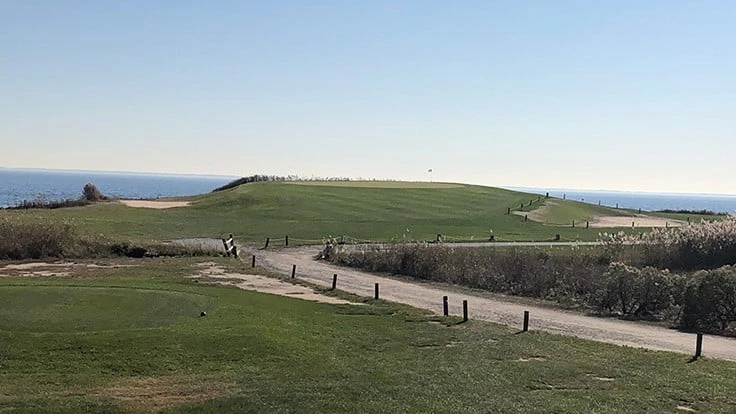
Bradley Klein
It’s been a strange year, this 2021. It started off with hopes of rolling back the pandemic and returning to normal. It has ended with accepting that we will have to live with this thing and make the best of it, despite the presence of looming risk. As usual, the golf world provided an opportunity to escape to some extent. I used to travel 150 days a year. It was closer to 30 this year, but that did not prevent me from experiencing some memorable things.
An incredible year for women’s golf
Over a three-month, mid-season stretch, I realized the most compelling golf I was watching was women’s golf. It started with the drama of Yuka Saso’s narrow victory in the U.S. Women’s Open at San Francisco’s Olympic Club Lake Course — where the maintenance staff was bolstered by nearly 30 female volunteers. Annika Sorenstam’s runaway win at the U.S. Senior Women’s Open at Brooklawn Country Club in Fairfield, Connecticut, was inspiring to watch. Nelly Korda sealed her yearlong dominance with an Olympic gold medal at Kasumigaseki Country Club East Course outside Tokyo.
Then came the AIG Women’s Open at Carnoustie, Scotland, won by Anna Nordqvist. Finally, there was the tension and excitement — or disappointment, depending on your point of view — of the Europeans eking out a Solheim Cup win at Inverness Club in Toledo, Ohio. In terms of personality, quality of courses and competitiveness of events, the women beat out the men in 2021 by a wide margin.
The course most in need of rescue/restoration
Lost in the publicity buzz of major restorations at well-known courses is the experience of everyday golfers on publicly accessible courses that desperately need upkeep and TLC. That’s what came to mind during a quick, non-playing stroll across windswept Timber Point Golf Course along Long Island’s South Shore. This 1927 design by Charles H. Alison featured a string of holes along Great South Bay, none more dramatic than the par-3 Gibraltar hole, which is now the fifth hole on the Blue Nine.
The once-private course is now in the hands of the Suffolk County Parks Department and was compromised by the addition of a third nine in the 1960s, then subjected to heavy use, structural neglect, and the relentless impact of tidal intrusion and rising water levels. A number of industry luminaries have quietly explored rescue measures, only to be frustrated by county politics. Help is needed badly. And soon.
Experienced superintendents
I am continually impressed by the professionalism and commitment of superintendents everywhere I go and when I call for help or technical advice. At the risk of leaving names out, I have learned a lot this year in the company of such turfgrass sages as Peter Bly of Brooklawn Country Club; Phil Cuffare of Oakland Hills Country Club; Ian Daniels at Teugega Country Club; Scott Dodson, CGCS, at Park Country Club in Buffalo; Jeff Goren, CGCS, of Mirabel, Golf Club; Keith Kresina of The Golf Club; Shaun Mitchell at Whitinsville Country Club; Pat Sisk at Longmeadow Country Club; Paul Stead at Kennett Square Golf & Country Club; and the real Minnesota twins, Chris Tritabaugh at Hazeltine National Golf Club and Jeff Johnson at Minikahda Club.
A letter
I get a lot of emails and a growing number of Twitter and LinkedIn messages. I don’t, however, get many actual letters. But the neatly typed one I got from a superintendent recently really moved me. As with so many course managers these days, it involved an underfunded, underpriced, quality facility mismanaged by a board that could not commit to a vision. Decision-makers were torn among those who could afford anything, those who did not care, and those who were financially stressed out and barely hanging on. This split was reflected in the golf course, which combined an all-too-familiar combination of old-world charm, benign neglect and near felonious assault.
As with every club I have encountered, it’s a matter of money, or at least convincing those who have it to part with a little more lest the facility continues its gradual slide into oblivion. The writer has my full support and knows it, though it isn’t enough without a turnaround in board intentions. It’s the superintendent and their understaffed crew who will keep the club in a patina of serviceable shape without the golfers really knowing about it. It’s the kind of letter that could have explained the status of several thousand colleagues.
Bradley S. Klein, Ph.D. (political science), former PGA Tour caddie, is a veteran golf journalist, book author (“Discovering Donald Ross,” among others) and golf course consultant. Follow him on Twitter (@BradleySKlein).
Latest from Golf Course Industry
- From the publisher’s pen: Conscientious of a bigger role
- Bernhard and Company partners with Laguna Golf Phuket
- Terre Blanche showcases environmental stewardship
- VIDEO: Introducing our December issue
- Bernhard and Company introduces Soil Scout
- Nu-Pipe donates to GCSAA Foundation’s Centennial Campaign
- GCSAA enhances golf course BMP tool
- Melrose leadership programs sending 18 to 2026 GCSAA Conference and Trade Show





